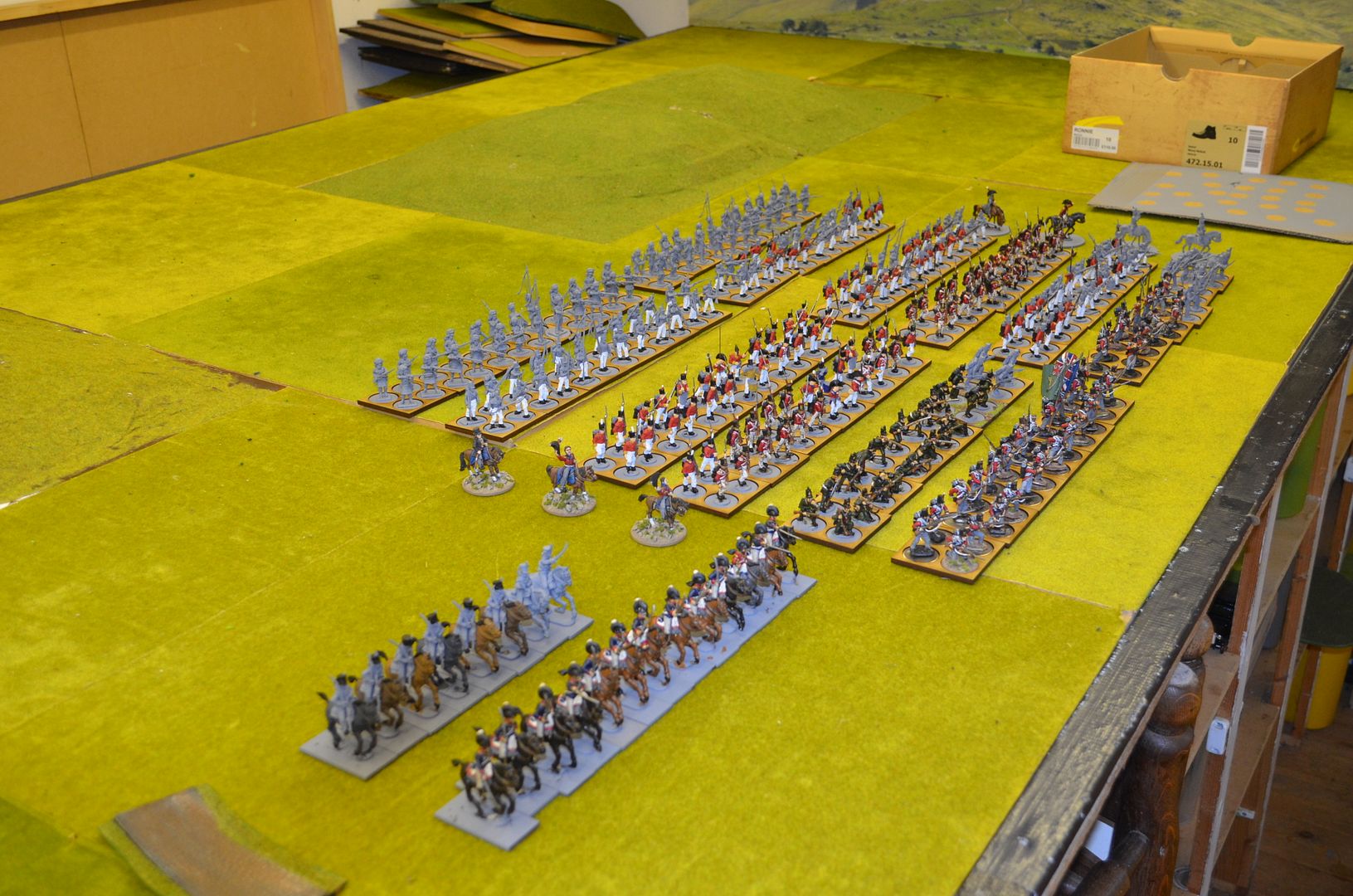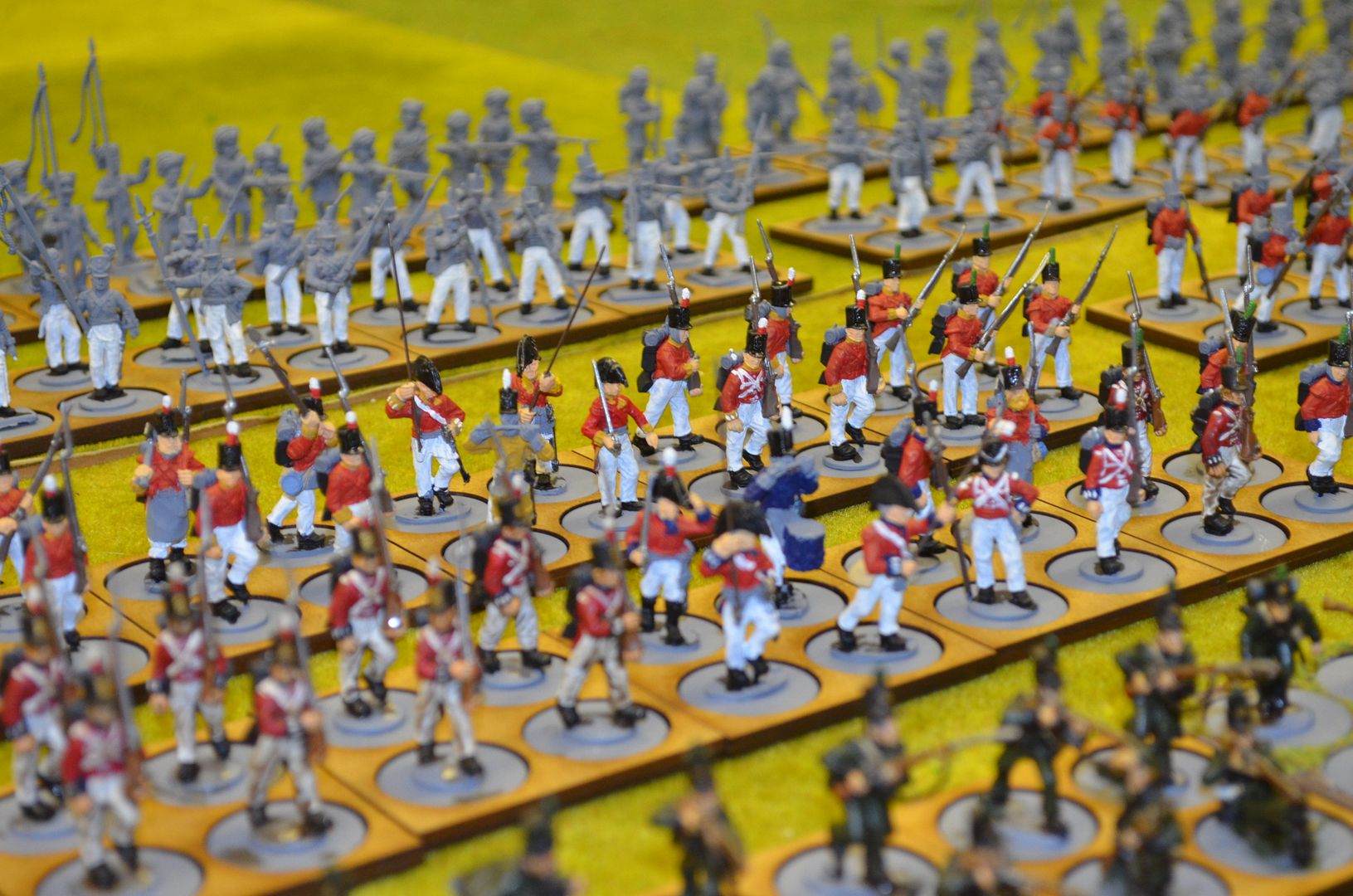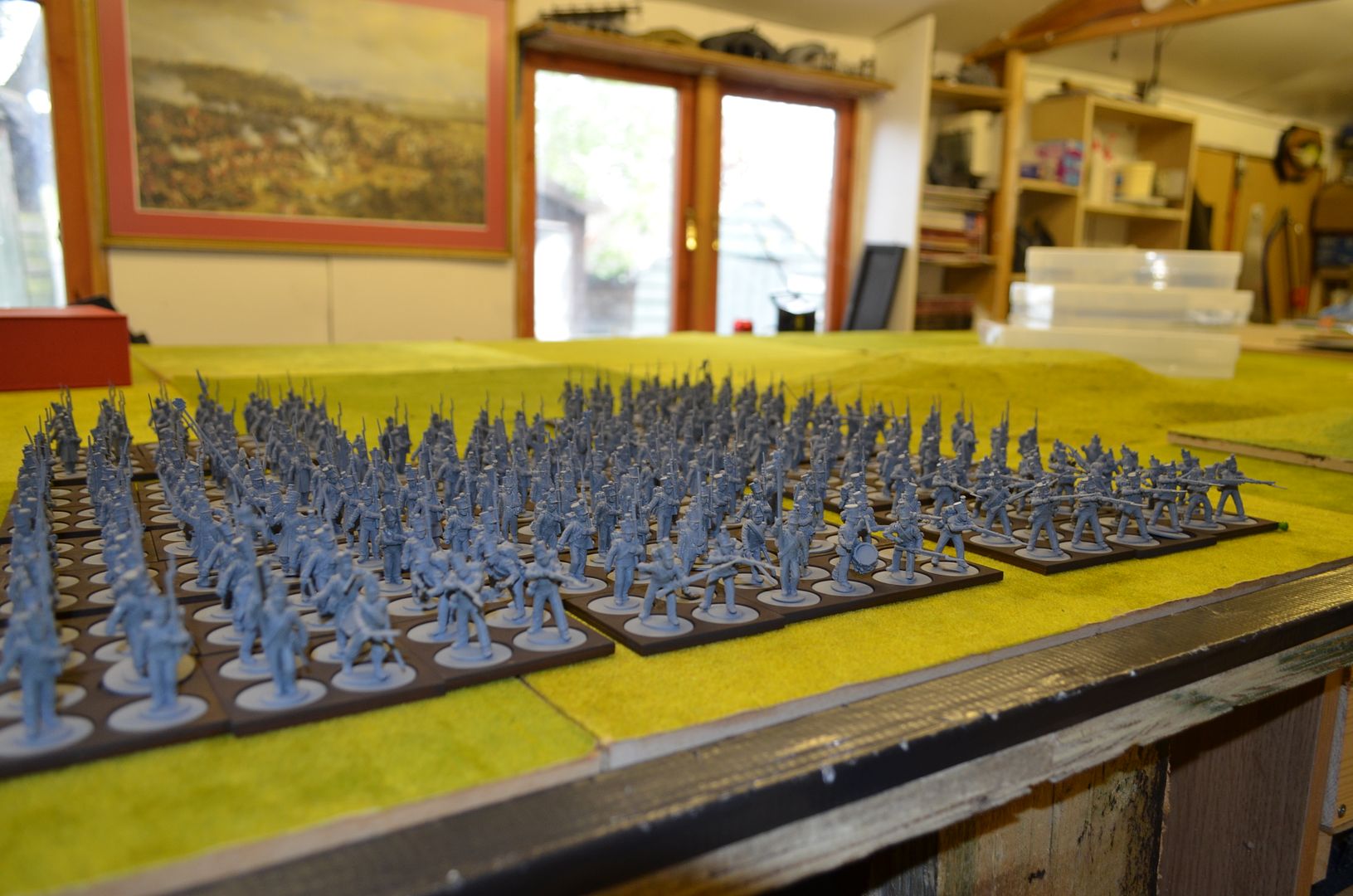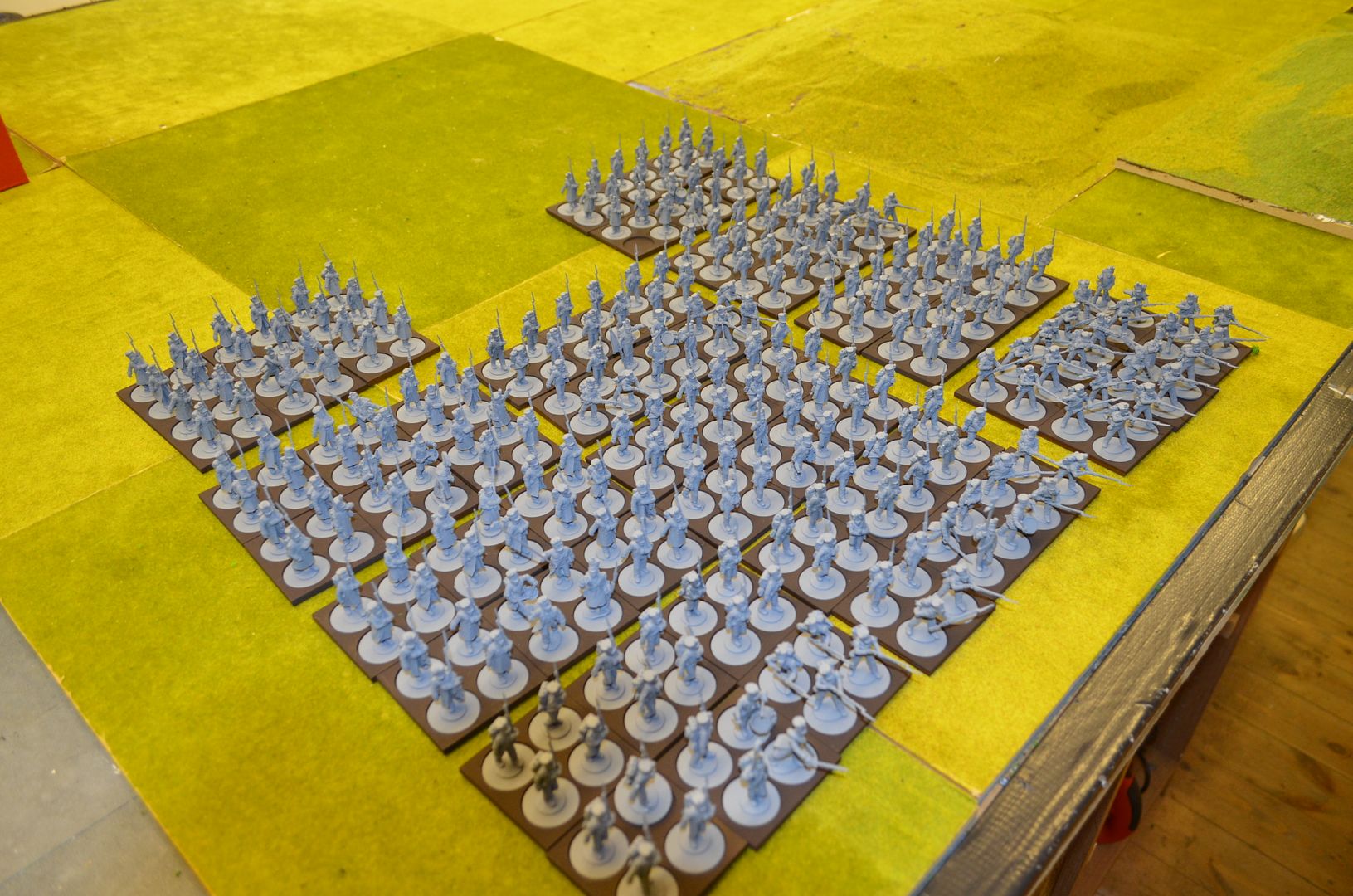Oh dear what have I done now?
A few weeks ago I announced on this blog that I was
embarking on a 28mm Napoleonic skirmish project well the scope of this project
has changed.
It’s no longer a skirmish based project but a bloody great
big battle project. I just couldn’t help myself.
Previous part here
http://shedwars.blogspot.co.uk/2017/04/napoleonic-skirmish-part-2.html
The British Forces 12 Battalions of Infantry (each 24 men) line up for inspection in various states of painting ......and some cavalry
Previous part here
http://shedwars.blogspot.co.uk/2017/04/napoleonic-skirmish-part-2.html
The British Forces 12 Battalions of Infantry (each 24 men) line up for inspection in various states of painting ......and some cavalry
I think it is fair to say that the sight of hordes of 28mm
figures on the table has hooked me line and sinker. Last year I completed my
ECW and Zulu projects almost and these have been some of the best wargames I
have ever played. So why not go for the granddaddy of all 28mm visuals – the
Napoleonic period.
In the last couple of weeks I have been hunting down deals
on the internet, asking for unwanted boxes on the Lead Adventure Forum and
slowly steadily building a rather large plastic and metal mountain. The
learning curves from my previous grand scale projects have been taken on board
which chiefly fall into three categories.
- Determine the size of units in advance and before you
buy.
For the Napoleonic period this has been quite simple –
infantry battalions will be a standard size – 24 figures strong and cavalry
units will be 12 figures strong. Each of these figures will be based singly but
in movement trays of four. This allows for a rapid change between large
blockbuster games such as Black Powder and individual based games (eg Chosen
Men). Furthermore most rulesets that come out tend to group figures in units
that are divisible by four (think Saga, Lion Rampant) and hopefully by doing
this I’ll future proof the armies.
In the case of Line Battalions of the Napoleonic period two
of four slot bases will be reserved for the Flank companies, one for the
command base and the remainder standard infantry units. The flexibility of
basing also allows for units to be shrunk or added to. Finally the four man
bases can be positioned in line, marching column, attack column or square with
little difficulty (march harder if the were based on 8x2 trays)
- Determine what size of game you want to play and buy
the figures before you start painting
Believe me when I say there is a rather perverse logic in
amassing the forces before you start painting and yes this could mean a
significant financial outlay at the beginning. Firstly bulk buying offers
greater opportunities to save on postage and multi deals, secondly it forces
you to accept that this is the next big project and deserves your attention
rather than meander from one genre to another (that’s what I tell myself but
NOT Mrs Shed).
Based on my crude calculations to have a meaningful game
each player needs to command a minimum of 8-12 units (estimates based on our
Pike & Shotte, Warmaster and Zulu Games. This means to support a 4 player
(2 vs 2) games in the Shed I need a minimum of 16-24 units per side. So at the
very least I need 16 British and 16 French units. On the basis that at least
half need to be infantry I need 8 battalions per side (that’s 184 figures each)
– a third will be cavalry (5 cavalry regiments per side) and three gun
batteries per side. I decided on 12 Battalions for the British (this includes Rifles & Highlanders)
When you start looking at the numbers this way you can make
an estimate of cost and total volumes. This is all based on plastic ranges at
the moment – Warlord, Perry & Victrix
Infantry – 360 figures at c50p per figure = £180
Cavalry – 120 figures at c£1.50 - £180
Artillery – 6 Batteries at £8 each - £48
A total of £408 note this excludes command etc
With the judicious use of ebay etc I reckon this overall
cost can be reduced by at least a third.
Painting the Figures
There is no easy way to say this but when you embark on such
a project you cannot expect to be playing in a matter of weeks. It will take
months but dealing in volumes has its advantages.
For starters I’d recommend painting one complete battalion
from start to finish – learn the figures, their shapes and nuances. This will
provide an estimate of the total time it takes to complete a unit. The first
British Line Battalion (actually 40 figures) took me around a week to complete
in five sessions each lasting about an hour and a half. That’s 9 hours for 40
figures – works out around 10 minutes per figure.
Painting production can be sped up considerably by painting
en masse…
For example last night I painted the boots and trousers of
over 100 British Line infantry in one sitting. By the end of the week I’ll have
painted the rest of the base colours – jacket , shakoes and flesh. Only then
will I start finishing off each battalion in turn.
I should add that I don’t do shading or highlights – just a
block paint approach and the army painters dip and then varnish. These are for
the tabletop and not display.
Oh yes whilst collecting the British Infantry I also started on the French...
11 Battalions assembled and a couple still to go
Oh yes whilst collecting the British Infantry I also started on the French...
11 Battalions assembled and a couple still to go
I am not going to work out the man hours required to
complete this project (it’s too scary but as it progresses the momentum will
drive me forward).
So with Salute just round the corner I think my focus will be on Artillery and Cavalry at the Show.
So with Salute just round the corner I think my focus will be on Artillery and Cavalry at the Show.
Until next time
Part 4 can be found here
http://shedwars.blogspot.co.uk/2017/05/napoleonic-project-part-4.html




This is going to look wonderful. I was interested to read your observations and experiences with production line block painting and dip, This is interesting me as the way to go for the wargame table.
ReplyDeleteJumping in straight at that scale with napoleonics is taking on an impressive challenge. There are few out there with the commitment to tackle this, but we know you can so will watch with interest.😀
ReplyDeleteLol ... whoops! Funny how skirmish turns into mass battle. That being said ... not a bad long term strategy to get to a mass battle level of troops. Start with skirmish, get playing, build up the collection. Great job Mr. Shed!
ReplyDeleteSomehow this does not come as a surprise...
ReplyDeleteHappy painting!
Hmmm...why am I not surprised by this....
ReplyDeleteI admire your tenacity and enthusiasm.
ReplyDeleteWell I wasn't expecting that! Nothing succeeds like excess! I painted a unit of Dutch Jaegers and it took me seven years!
ReplyDeleteNot really that big a surprise! I'm also going for a napoleonic skirmish /big battle force and I've broadly come to the same view, I won't singly base all of them but I'm going 45mm x45mm which is the same as 4x1p sabot bases, I will watch with interest.
ReplyDeleteBest Iain